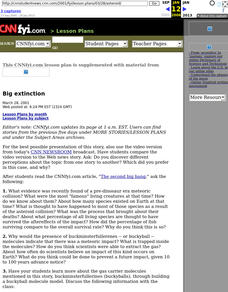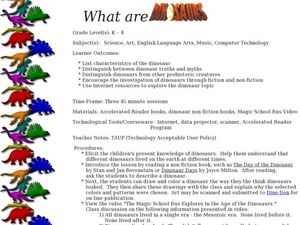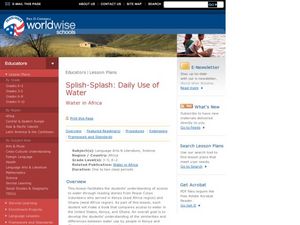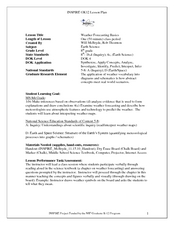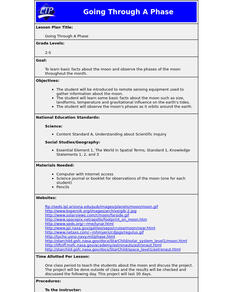Curated OER
Ecosystems Lesson Plan
Students research ecosystems (rainforest, desert, grassland, woodland, and arctic tundra). Students compare the seven continents and the importance of proximaty to the equator.
Curated OER
Celebration of Trees
Second graders listen to various, grade appropriate stories about trees. They create their own construction paper trees and discuss the importance of trees to the ecosystem and the importance of taking care of them. Finally, 2nd graders...
Curated OER
An Internet Lesson on the Planets
Sixth graders research one of the planets in the solar system based on questions that they develop using information from the Internet. They create a travel brochure using the research information.
Curated OER
Theories
Students view a series of videos that explore the development, formation and arguments for the geocentric model of the solar system. Studenst investigate the heliocentric model of the solar system and consider how scientific theories...
Curated OER
Biggest Trees in the United States
Students use the Internet (or printed sources) to locate information. They fill in missing information on a graphic organizer (chart) and use the data to answer questions. The research skills help students to develop higher order...
Curated OER
Weather Analysis - Lab Activity
Ninth graders perform research in the subject of weather to answer several key questions to increase comprehension of concepts. Students use weather prediction as an application for the research.
Curated OER
Big Extinction
Students discuss evidence of a pre-dinosaur era meteoric collision, and its impact on living creatures. They build buckyball molecule models out of marshmallows, toothpicks, and soccer balls.
Curated OER
Analyzing the Relationship between Snowpack and River Flow
Young scholars use the Internet to research current and past snowpack levels and river gauging station readings. They determine the relationship between snowpack and river flow. They predict future river flow.
Curated OER
Introduction to Bacteria
Beginning biologists survey several websites to learn about the types, structure, motility, feeding habits, and reproductive methods of bacteria. All websites are linked to the lesson plan, so you can have individuals access it and click...
Curated OER
What are Dinosaurs?
Students explore the attributes of dinosaurs. In this dinosaur lesson, students read books and watch videos featuring dinosaurs. Students also research dinosaur traits using Internet sources.
Curated OER
Home-Made Clouds
Fourth graders witness cloud formation in a jar during a teacher lead simulation. They research, draw and predict weather using information they gather about clouds.
Curated OER
Rock River Watershed
Students discover what a watershed is and which one they live in. Using the internet, they research why watersheds are important to an ecosystem and how to keep them from getting polluted. They use a map to locate various items within a...
Curated OER
What's Up With the Water Cycle?
Students explore the water cycle. Students identify the stages in a water cycle and create a PowerPoint presentation based on their knowledge.
Curated OER
High School Energy Audit
A student-led energy audit of their high school is the focus of this energy lesson. They review the cost of energy in their school, find where it is being wasted, and attempt to cut costs by 10%. A worthy lesson!
Curated OER
Recycling: Problem solved or problem ongoing?
Students research on the Web, magazines, and newspapers the extent of waste and recycling situation has been solved. They focus on the community, get facts and figures to show how recycling goes on there.
Curated OER
CO2 and Air Pollution
Seventh graders observe and test for the presence of carbon dioxide gas. They compare concentrations of carbon dioxide gas and conclude high concentrations of carbon dioxide gas are unhealthy for human beings.
Curated OER
Splish-Splash: Daily Use of Water
Learners explore the daily use of water in Kenya and Ghana. In this Peace Corps lesson, students compare similarities and differences between water use by people in Kenya and Ghana and their own communities as they create books that...
Curated OER
Geology and it’s Influence
Middle schoolers compare current geological map and the one from 1800's. In this earth science lesson, students discuss differences between the two and explain the factors that caused the change. They write an essay about how these...
Curated OER
Moon Observations
Students study the science of the moon. In this moon observations lesson plan, students study vocabulary associated with the moon, study a lunar calendar, and a phases of the moon's orbit around the Earth.
Curated OER
Is it Really Winter in Australia? It is June!
The purpose of this activity is to determine how the location of a place on the Earth (hemisphere) determines what season that place is experiencing relative to the Sun's rays. Day one the pupils will be introduced to the terms equator,...
Curated OER
Weather Forecasting Basics
Eighth graders analyze weather diagrams and weather maps. In this earth science instructional activity, 8th graders explain why it is important to know the weather. They complete a handout at the end of the instructional activity.
Curated OER
Seasons of the Year
Students examine how the link between the tilt of the Earth's axis to the ecliptic and seasons of the year--length of day, effectiveness of sunlight, polar day and night, and seasons south and north of the equator, as well as near it.
Curated OER
Tracking Sunrise and Sunset
Young scholars collect, record, and graph the sunrise and sunset times. They explain how the relationship between the tilt of Earth's axis and its yearly orbit around the sun produces the seasons.
Curated OER
Going Through A Phase
Students are introduced to remote sensing equipment used to gather information about the moon. They learn basic facts about the moon such as size, landforms, temperature and gravitational influence on the earth's tides.
Other popular searches
- Science Earth Day Activities
- Science Earth Day Lessons
- Science Earth Day
- Earth Day Science Projects
- Earth Day Science Lesson Plans
- Earth Science Earth Day








